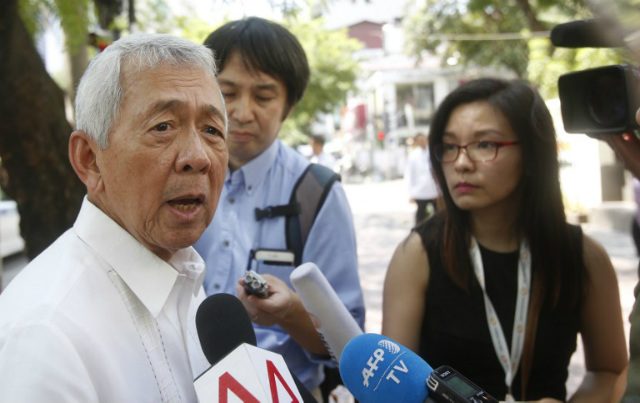SUMMARY
This is AI generated summarization, which may have errors. For context, always refer to the full article.

MANILA, Philippines – Foreign Secretary Perfecto Yasay Jr claims he was never a US citizen because even if the US granted him American citizenship in 1986, he executed an affidavit in 1993 saying this is “null and void.”
Yasay explained that he was “disqualified” from US citizenship. This was because he had a “preconceived intent” of abandoning his US residency when he became American.
He said he, in fact, abandoned his US residency in 1987.
Eventually, in February 1993, Yasay filed an affidavit saying that he abandoned his US residency in 1987, making him “ineligible” for, and “disqualified” from, having US citizenship.
When he faces the Commission on Appointments (CA) on Wednesday, March 8, Yasay’s claim that he was never American will likely revolve around this 1993 affidavit again. (READ: TIMELINE: When Foreign Secretary Yasay was a foreigner)
Members of the CA earlier told Rappler they were inclined to reject Yasay’s appointment as foreign secretary after he lied under oath.
‘There is an established process’
Is an affidavit enough to nullify one’s American citizenship?
Immigration lawyers sought by Rappler said one cannot unilaterally declare through an affidavit that one’s US citizenship is nullified, as Yasay did.
One of the lawyers we interviewed was Ted Laguatan, who, for more than 25 years, has been considered by the California State Bar as an expert-specialist in US immigration law.
Laguatan told Rappler on Tuesday, March 7: “One cannot unilaterally just declare himself as no longer a US citizen through an affidavit and immediately lose one’s citizenship. There is an established process for renouncing one’s US citizenship.”
What about Yasay’s claim that he had a “preconceived intent” of abandoning his American citizenship?
Laguatan explained: “Having a preconceived intent to live in another country permanently when applying for US citizenship does not disqualify one from being naturalized. So many applicants in fact have this preconceived or prior intent to live permanently in other countries when applying for naturalization for whatever reasons: work related, retirement, family ties, etc.”
Also, he asked, how can US citizenship laws automatically make “null and void” one’s citizenship “on the basis of something unknown, unproven, and not even prohibited?”
“Either the US government takes action to make one’s US citizenship null and void or the US citizen gives it up. Either way, there are formal established processes for doing these,” Laguatan said.
Earlier, Laguatan also said that “if a person holds a valid US passport, he is undoubtedly a US citizen.”
Despite previous denials, Yasay admitted on Monday, March 6, that he used to have a US passport.
Denaturalization ‘a judicial process’
Elaine San Juan, a lawyer admitted to the California State Bar in 2006, shared a similar opinion about whether Yasay can unilaterally nullify his US citizenship. San Juan also earlier co-authored a Thought Leaders piece for Rappler titled, “Refuting Yasay: No oath of allegiance for green card holders or NY Bar passers.”
In an email to Rappler on Tuesday, San Juan explained that “the revocation of naturalization, or ‘denaturalization,’ is a judicial process.” She also said “it does not appear” that Yasay “went through the denaturalization process.”
She cited the US Immigration and Nationality Act that mentions the US Attorney General’s authority to “correct, reopen, alter, modify, or vacate an order naturalizing the person.”
San Juan said that it “would be interesting to know” whether the US authorities, in this case the US Attorney General, “did in fact vacate the order naturalizing Mr Yasay after he submitted the affidavit in 1993.”
San Juan explained, “To have the effect of non-naturalization, the order that was issued by the US court that granted him naturalization must be vacated since his naturalization was covered by a court order.”
“As such, it cannot be done unilaterally,” San Juan said. “No shortcuts, no jumping to conclusions.”
Rappler also asked San Juan about the Certificate of Loss of Nationality of the United States that America granted Yasay on June 28, 2016.
Does the US issue such a certificate to individuals who were not citizens in the first place?
San Juan replied: “That is a logical analysis. Why would one obtain a Certificate of Loss of Nationality if he was not a citizen in the first place? The issuance of the Certificate of Loss of Nationality of the United States only confirmed the expatriation act he did last June 28, 2016.”
San Juan said that if Yasay’s purpose in applying for the certificate was to end speculations about his citizenship, “then he has achieved it as he has formally renounced his US citizenship as evidenced by the document.
“But if he will insist on nullity of naturalization, then that document simply does not serve the purpose. At best, he may have to go through a judicial or administrative process to have the (court) order for his naturalization vacated,” she said. – Rappler.com
Add a comment
How does this make you feel?
There are no comments yet. Add your comment to start the conversation.